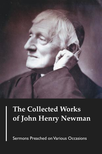Collected Works of St. John Henry Newman (31 vols.)
Digital Logos Edition
Overview
The Collected Works of St. John Henry Newman (31 vols.) contains the most influential works written by John Henry Newman. Cardinal Newman ranks as a giant among nineteenth century academics. Newman was a pioneer in the modern study of Church history and doctrine, and his works represent some of the most thoughtful and complete treatments on the subject. Newman's works reveal a close relationship between his subjects of inquiry and his own personal journey of faith. No place is this more evident than in his monumental Essay on the Development of Christian Doctrine.
In addition to his many essays and lectures on history and theology, the Collected Works of John Henry Newman (31 vols.) includes over two hundred fifty sermons from Newman and his revered poem, The Dream of Gerontius. Few scholars in the modern era have shown such academic rigor and complete surrender to the Gospel of Jesus Christ and His Church as John Henry Newman. With this massive collection of Newman's most important works you can track Newman's quest for the via media of Anglicanism all the way from the fourth century Church Fathers through his own conversion to the Catholic Church. Newman's pioneering ideas sparked much discussion during his time. Follow the criticism of his peers through multiple correspondences—including the most public of Newman's critiques from Mr. Charles Kingsley that resulted in Newman's Apologia Pro Vita Sua (A Defense for His Life). The thoughts and meditations of John Henry Newman are of equal benefit to the serious student of Church history and the layperson intrigued by Christian spirituality.
If purchased elsewhere, this thirty-one volume collection could cost over one thousand dollars. With this collection, you will be receiving over 11,400 pages of timeless meditations on Scripture and priceless evaluations on Christian history. In addition, the Logos Bible Software edition of John Henry Newman's works contains links directly to Scripture and other books and articles in your digital library. All Scripture references display the verse on mouse over, and each reference is linked to the original language texts of the Bible and the English translations in your digital library.
- Extensive studies on Church history from an author burdened for the Church of Jesus Christ
- Over 15 lengthy essays on key issues pertaining to the history of Christianity
- Over 250 sermons delivered to various audiences
- Logos edition provides integrated access to Scripture references, instantly linking to English and original text versions of the Bible
- 31 volumes totaling over 11,400 pages
The quality of his literary style is so successful that it succeeds in escaping definition. The quality of his logic is that of a long but passionate patience, which waits until he has fixed all corners of an iron trap. But the quality of his moral comment on the age remains what I have said: a protest of the rationality of religion as against the increasing irrationality of mere Victorian comfort and compromise.
The philosophical and theological thought and the spirituality of Cardinal Newman, so deeply rooted in and enriched by Sacred Scripture and the teachings of the Fathers, still retain their particular originality and value.
—Pope John Paul II
Newman placed the key in our hand to build historical thought into theology, or much more, he taught us to think historically in theology and so to recognize the identity of faith in all developments.
—Joseph Cardinal Ratzinger (Pope Benedict XVI)
Read in the light of subsequent development in the almost one hundred years since his death, the Essay on Development has proved to be the seminal work for the thought of theologians and historians—and, above all, of historians of theology, who, even if they have been obliged to disagree with its methods or its conclusions, have been no less obliged to accept its formulation of the central problem. Not only to his latter-day disciples, therefore, but to many of those who have drawn other conclusions from his insights, John Henry Newman has become the most important theological thinker of modern times.
—Jaroslav Pelikan
Newman’s thought was nourished by the Fathers rather than by the Schoolmen, and his main contribution to the thought of his age lay much more in the fields of psychological analysis and acute moral perception than in matters strictly theological. His fruitful use of the idea of development, in its application to the growth of Christian doctrine, and his profound insight into the nature and motives of religious faith, place him in the first rank of modern Christian thinkers.
—The Oxford Dictionary of the Christian Church
Newman's importance lies in the fact that he showed the possibility of a moderate path through the various wild religious extremes of the 19th century ... . First as an Anglican and then as a Catholic, Newman pioneered a moderate, sensitive traditionalism that combined intelligence and scholarship with penetrating spirituality.
—Jonathan Hill, The History of Christian Thought
- Title: Collected Works of John Henry Newman (31 vols.)
- Author: John Henry Newman
- Volumes: 31
- Pages: 11,450
This title is included in the following collections
You can save when you purchase this product as part of a collection.
Verbum 5 Silver Legacy Library
$349.99$349.99Verbum 8 Ordinariate Gold Lega...
$849.99$849.99Verbum 5 Gold Legacy Library
$849.99$849.99Verbum 9 Ordinariate Gold Lega...
$849.99$849.99
- $1,499.99
- $1,499.99
- $1,499.99
- $1,499.99
- $1,499.99
- $2,499.99
- $2,999.99
- $2,999.99
- $2,999.99
- $3,413.99
- $4,749.99
- $4,749.99
- $7,749.99
- $7,749.99
- $11,399.99
- $11,399.99
- $21,749.99
- $24,999.99
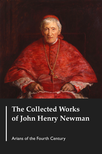
John Henry Newman was on the translation team for the collected works of Athanasius that appear in volume four of Philip Schaff's Nicene and Post-Nicene Fathers. Newman's familiarity with the writings of Athanasius gave him great insight into the historical context of the Arian Controversies. Newman's survey of Arianism during the fourth century begins with a systematic overview of each major Christian center or school of thought in regards to their treatment of major Arian doctrines. Newman addresses key evidence for an accepted Trinitarian theology prior to 300 A.D. and argues for a normalized Apostolic doctrine of the Trinity prior to the Council of Nicea.
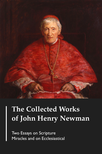
Two Essays on Scripture Miracles and on Ecclesiastical
- Author: John Henry Newman
- Publisher: Basil Montagu Pickering
- Publication Date: 1870
- Pages: 393
In these two essays—On Scripture Miracles and On Ecclesiastical Miracles—John Henry Newman argues in favor of the many miraculous acts of God throughout history. Newman begins his argument by providing a proper definition for a miracle and necessary evidence required to substantiate the claim of a miracle. Then Newman discusses several specific miracles and gives well reasoned arguments for the reliability of the historical claim.
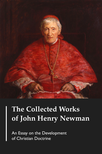
What determines real Christian doctrine? How have the primary tenets of Christian theology come out of biblical texts that do not explicitly provide for such conclusions? John Henry Newman wrestled with these questions for much of his adult life. In his Essay, Newman provides seven tests by which the development of an idea may be legitimized. Through this process he concludes that there has never been any innovation in Christian theology, only development and clarification to accommodate the needs of a specific era.

This collection of essays was written early in Newman's career from 1828–1842. Newman's topics vary from literary criticism and the Greek poets to the catholicity of the Anglican church and the concept of Antichrist. These two volumes capture the academic breadth of Newman's career as a Fellow at Oriel College. All of these articles were written during Newman's Anglican period and do not always reflect his later thoughts toward the Catholic church.
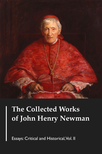
This collection of essays was written early in Newman's career from 1828–1842. Newman's topics vary from literary criticism and the Greek poets to the catholicity of the Anglican church and the concept of Antichrist. These two volumes capture the academic breadth of Newman's career as a Fellow at Oriel College. All of these articles were written during Newman's Anglican period and do not always reflect his later thoughts toward the Catholic church.
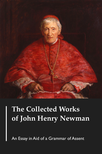
Can we trust theological conclusions, even if we do not fully comprehend them? Can we believe in God, though no evidence can be substantially provided for His existence? Every Christian struggles with these basic questions of belief. The modern world continues to shut out what cannot be proven as fact and faith is increasingly an unwanted and unmerited partner in a scientific world. During the height of English empiricism, John Henry Newman fought for the legitimacy and necessity of faith as a major component to the human intellect. Often called Newman's seminal work, Grammar of Assent was written over the course of twenty years as Newman, himself, grappled with the these foundational questions of Christian apologetics.
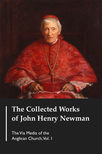
The Via Media of the Anglican Church, Vol. 1
- Author: John Henry Newman
- Publisher: Basil Montagu Pickering
- Publication Date: 1877
- Pages: 355
Early in his career John Henry Newman held the view that the Anglican Church of England provided a sort of “middle way” between the perceived errors of the Roman Catholic church on the one hand, and those perceived errors manifested in many Protestant churches on the other hand. This two volume work outlines Newman‘s argument in support of this view and his recommendations for enacting further reform within the Anglican church.
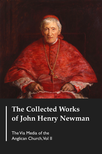
The Via Media of the Anglican Church, Vol II
- Author: John Henry Newman
- Publisher: Basil Montagu Pickering
- Publication Date: 1878
- Pages: 419
Early in his career John Henry Newman held the view that the Anglican Church of England provided a sort of “middle way” between the perceived errors of the Roman Catholic church on the one hand, and those perceived errors manifested in many Protestant churches on the other hand. This two volume work outlines Newman‘s argument in support of this view and his recommendations for enacting further reform within the Anglican church.
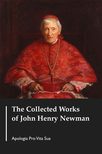
Apologia Pro Vita Sua
- Author: John Henry Newman
- Publisher: D. Appleton and Company
- Publication Date: 1865
- Pages: 384
Apologia is a detailed autobiography in defense of Newman’s theological and ecclesiastical conclusions. Newman wrote this volume as a formal rebuttal to many negative claims and questions concerning his theology and conversion to Catholicism. By the Fall of 1863, these allegations came to a head with the publication of some negative comments about Newman in the periodical Macmillan's Magazine. In the article, Mr. Charles Kingsley accused (then) Father Newman of possessing a weakened understanding of the source and necessity of truth and subsequently defamed many central tenets of Catholicism. Newman and Kingsley maintained brief correspondence resulting in a formal retraction from Kingsley—all of which appear as the Foreword to the present publication. After the failed attempt at corresponding with Kingsley directly, Newman published this volume and was hailed as the defender of Catholic doctrine in England. Apologia, and the included correspondence, is an essential step to understanding the theology of John Henry Newman and the nineteenth century Catholic Church.
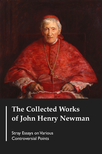
Stray Essays on Various Controversial Points
- Author: John Henry Newman
- Publisher: M. Billing and Co.
- Publication Date: 1890
- Pages: 107
Stray Essays on Various Controversial Points includes three essays written later in Newman’s life. The first essay, “Inspiration in its Relation to Revelation”, is an attempt to account for the biblical foundation for Catholic teachings. The second, “Further Illustrations” is a continuation of the first essay and was written in reaction to some criticism he received from the Catholic community regarding certain statements made in “Inspiration in its Relation to Revelation”. The final essay, “Revelation in its Relation to Faith”, outlines Newman's mature response to the the place of faith and religion within the reasoned human experience.
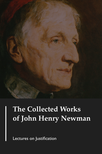
John Henry Newman delivered these lectures in the early 1830's during his career as a professor of Anglican theology. Lectures on Justification uncovers the scriptural and historical understanding of justification within a sacramental tradition. Throughout these lectures, Newman defends justification as a free gift of God received through the sufficiency of Christ's sacrifice. The lecture series closes with special attention given to the role of the sacramental rites in the faith of the believer, and the importance of preaching the Gospel of Jesus Christ as presented in scripture.
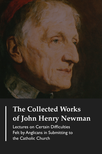
Few people in history can so accurately outline the reservations of Anglicans toward the Catholic Church as John Henry Newman. Newman was given opportunity to share these lectures—after his conversion to Catholicism—before a Catholic audience. He reflects upon his role in the Oxford (Tractarian) Movement of 1833. During this crucial period in Anglican history, high Anglican churches were caught between the imposing English government and the strict rule of Rome. Throughout this series of lectures, Newman clearly articulates the opposition of Anglicans to certain Catholic institutions like the Catholic priesthood and Marian doctrines.
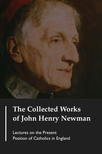
Nineteenth century England was notoriously intolerant of the Catholic Church within its borders. Newman delivered these addresses to a fraternal group of Catholic priests and professors advising them how to remain faithful to their vows within an established Protestant culture. Newman's intention is to point out the logical fallacies undergirding the Protestant prejudices of Rome. He carefully dissects the Protestant misunderstanding of key tenets of Catholicism and then suggests ways for Catholics to faithfully handle these misinformed viewpoints.
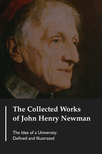
The Idea of a University: Defined and Illustrated
- Author: John Henry Newman
- Publisher: Basil Montagu Pickering
- Publication Date: 1873
- Pages: 527
What is the role of theology in higher education? Can a university remain faithful to pursuits of knowledge and faith at the same time? In this collection of nineteen addresses, Newman casts his vision for maintaining an effective religious liberal arts university to the founding faculty of the University College, Dublin. Newman defends faith and religion as essential components to human knowledge and the expansion of Western civilization. In his own time, Newman redefined the role of religious education within the university producing an academic model that has proven the test of time. In an era when religion and education are moving farther apart, Newman's philosophy of education can prescribe a tested path for religious educators.
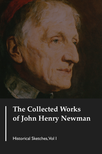
Historical Sketches, Vol I
- Author: John Henry Newman
- Publisher: Basil Montagu Pickering
- Publication Date: 1873
- Pages: 445
These three volumes are comprised of lengthy lectures and articles written for encyclopedic publications. John Henry Newman was among the greatest historians of his day and few can escape his influence on the study of Christian history. Volume 1 addresses the following:
- Lectures on the History of the Turks, in their Relation to Europe
- Personal and Literary Character of Cicero
- Apollonius of Tyana
- Primitive Christianity
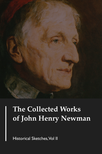
Historical Sketches, Vol II
- Author: John Henry Newman
- Publisher: Basil Montagu Pickering
- Publication Date: 1872
- Pages: 496
These three volumes are comprised of lengthy lectures and articles written for encyclopedic publications. John Henry Newman was among the greatest historians of his day and few can escape his influence on the study of Christian history. Volume 2 addresses the following:
- The Church of the Fathers
- The Last Years of St. Chrysostom
- Trials of Theodoret
- The Mission of St. Benedict
- The Benedictine Schools
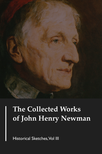
Historical Sketches, Vol III
- Author: John Henry Newman
- Publisher: Basil Montagu Pickering
- Publication Date: 1873
- Pages: 421
These three volumes are comprised of lengthy lectures and articles written for encyclopedic publications. John Henry Newman was among the greatest historians of his day and few can escape his influence on the study of Christian history. Volume 3 addresses the following:
- Rise and Progress of Universities
- The Northmen and Normans in England and Ireland
- Medieval Oxford
- The Convocation of the Province Canterbury
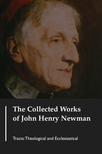
Tracts: Theological and Ecclesiastical
- Author: John Henry Newman
- Publisher: Basil Montagu Pickering
- Publication Date: 1874
- Pages: 405
This volume contains several short essays delivered between 1835 and 1859. All theological and historical in topic, these essays cover the range of Early Church heresiology to a historical account of the Rheims-Douay English version of the Bible. The essays included are:
- Dissertatiunculae Quatuor Critico-Theologiae
- Causes of the Rise and Successes of Arianism
- The Heresy of Apollonaris
- At. Cyril’s Formula
- The Ordo de Tempore in the Breviary
- History of the Text of the Douay Version of Scripture
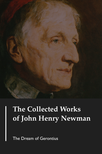
The Dream of Gerontius
- Author: John Henry Newman
- Publication Date: 1865
- Pages: 22
Newman wrote The Dream of Gerontius later in his life as he was beginning to contemplate his final end. This magnificent poem follows Gerontius from his earthly end to his introduction before the heavenly host. The poem was first performed in 1900 by the English composer, Edward Elgar. Newman's masterpiece continues to be performed to this day.
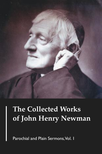
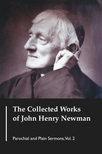
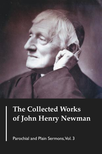
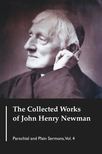
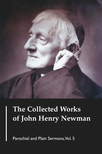
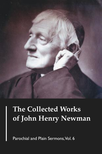
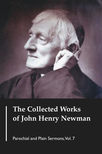
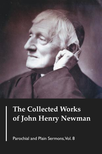
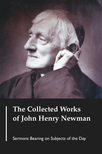
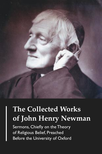
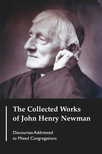
Discourses Addressed to Mixed Congregations
- Author: John Henry Newman
- Publisher: Patrick Donahoe
- Publication Date: 1853
- Pages: 282
St. John Henry Cardinal Newman (February 21, 1801 – August 11, 1890) was a priest and Cardinal in the Roman Catholic Church. His father was a banker and his mother's family was French Huguenot. Newman was raised in a strict Calvinist home and received his primary education at the famous Ealing School. John Henry Newman graduated from Trinity College, Oxford in 1821 and was elected to a fellowship at Oriel College, Oxford in the following year. On June 13, 1824 he was ordained into the Anglican priesthood. From the early 1830's until 1845, Newman was a leading figure in the Oxford Movement, a group of Anglican priests and scholars from Oxford who sought to restore the rites of the Anglican church to their Apostolic roots in the Early Church. Between 1842 and 1845, during a time of solitude and the completion of Essay on the Development of Christian Doctrine, Newman underwent a process conversion to Roman Catholicism. Newman also published the Oxford Conservative Journal during this time period as a platform for retracting any negative remarks he previously assailed towards the Roman Church.
He was officially received into the Catholic Church on October 9, 1845. The conversion of John Henry Newman to Catholicism was the result of a life's long struggle to reconcile the historic faith handed down from the Apostles with his own Anglican tradition. Frustrated with the errors inherent in both Protestantism and Roman Catholicism, Newman abandoned his search for the via media (or, middle way) of Anglicanism and converted to the Roman Catholic Church. In 1848, Newman founded the Birmingham Oratory at Maryvale and began ministering to the Catholic population of the city. In 1851, the Bishops of Ireland elected to start a Catholic university in Dublin and they appointed Newman to be the founder and first rector of the institution. Maintaining his ministry at the Birmingham Oratory, Newman established what would become University College, Dublin. His Idea of a University was prepared for founding faculty of the university at Dublin. On May 12, 1879 Pope Leo XIII appointed Newman to the college of Cardinals. John Henry Cardinal Newman died on August 11, 1890. Cardinal Newman was canonized a saint in October 2019.
Reviews
2 ratings
Michael Maria Waldstein
8/25/2013

RevSarge
8/5/2013
